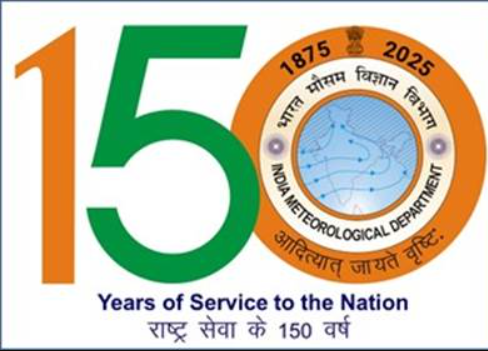
India Meteorological Department (IMD) has completed 150 years since its establishment in 1875. IMD functions under the Ministry of Earth Sciences and plays a crucial role in weather forecasting and climate services in India.
During the celebration of its 150th Foundation Day , the Prime Minister released the IMD Vision-2047 document and launched ‘Mission Mausam,’ . As we celebrate the 150th anniversary of the India Meteorological Department, let's explore its history, important contributions, and achievements.150 Years of India Meteorological Department
The 150th anniversary of the India Meteorological Department (IMD) is being celebrated on January 15, 2025 . The main celebration is being held at Bharat Mandapam, New Delhi, with scientists, disaster managers, and government officials expected to attend. During the celebrations, Prime Minister Narendra Modi unveiled the IMD Vision 204 7, aiming to achieve zero loss of life from severe weather events through proactive measures and accurate forecasts. He also launched Mission Mausam, highlighting India's commitment to becoming a climate-smart nation and enhancing its disaster management capabilities. Image Credit: PIB/IMD
Image Credit: PIB/IMD
About India Meteorological Department
The IMD, or India Meteorological Department, is the national meteorological servic e of India. Its headquarters is located in New Delhi. The IMD is responsible for providing weather forecasts, monitoring climate patterns, and issuing warnings for severe weather events. The department operates under the Ministry of Earth Sciences and plays a crucial role in ensuring public safety and preparedness.| India Meteorological Department - Overview | |
| Established | January 15, 1875 |
| IMD Headquarters | Mausam Bhavan, Lodhi Road, New Delhi |
| Ministry | Ministry of Earth Sciences |
| Regional Offices | Chennai, Mumbai, Kolkata, Nagpur, Guwahati, New Delhi |
| Services | Rainfall Information, Monsoon, Cyclone, Agromet, Climate Services, Urban Meteorological Services, Aviation Services, Climate Hazard & Vulnerability Atlas, Geospatial Services |
| Responsibilities |
|
| Key Initiatives |
|
| Specialization | One of six Regional Specialized Meteorological Centres of the World Meteorological Organization |
| Director General | Mrutyunjay Mohapatra |
| Website | mausam.imd.gov.in |
India Meteorological Department History
The IMD was founded on January 15, 1875, after severe weather events, like the 1864 tropical cyclone in Calcutta and monsoon failures, highlighted the need for a central weather service. Initially focused on basic observations, the IMD expanded over time , establishing a network of observatories to improve local weather predictions. The IMD started with basic weather observations and data collection. In the early 20th century, it set up a network of observatories across the country, improving localized weather predictions. Continuously upgrading its technology, the IMD introduced Doppler radar, satellite imagery, and weather prediction models. Today, it is a global leader in meteorological services.Indian Meteorological Department Role
The India Meteorological Department plays a key role in protecting lives and property by providing accurate weather forecasts and disaster warnings. Here are some of the key roles played by it:- Disaster Management Role : The role of the IMD in disaster management is critical. The department provides timely and accurate weather forecasts that help communities prepare for severe weather events.
- Warnings for Natural Disasters: IMD issues warnings for cyclones, floods, and other disasters, saving lives and reducing economic losses.
- Support for Agriculture: Farmers rely on IMD’s rainfall and temperature forecasts to make informed decisions about planting and harvesting.
- Aviation Industry Support: The aviation sector depends on IMD for accurate weather data to ensure safe flight operations.
- Climate Change Research: IMD monitors climate patterns and provides data to help policymakers and researchers develop strategies for climate change mitigation.
Achievements of India Meteorological Department
The India Meteorological Department has made significant progress in weather forecasting and disaster management over its 150-year history, adapting to new technologies and challenges. Here are some of the key achievements of IMD over the years:- Improved Forecast Accuracy: Since 2014, weather forecasting accuracy has increased by 40% due to advanced prediction models.
- Expanded Doppler Radar Network: The number of radar stations grew from 15 in 2014 to 39 in 2023, improving weather monitoring and warnings.
- Use of Technology: IMD introduced platforms like the Crowdsource web interface and the "Public Observation" mobile app, allowing users to report local weather conditions.
- Reduced Cyclone Fatalities: Accurate warnings have decreased cyclone-related deaths from 10,000 in 1999 to zero between 2020 and 2024.
IMD Vision 2047
The IMD Vision 2047 document, sets the direction for India's weather resilience and climate change adaptation as the country approaches its 100th year of independence. This vision focuses on improving weather forecasting, disaster management, and climate action in the coming decades. Here are some key agendas of this doc:- Zero Disaster-Related Deaths: The vision aims to eliminate fatalities from weather-related disasters by 2047 through proactive disaster management.
- Enhanced Forecast Accuracy : IMD targets a forecast accuracy of 90% for five-day forecasts and 80% for seven-day forecasts.
- Comprehensive Weather Detection: The goal is to achieve 100% weather detection, ensuring all significant weather events are monitored and reported accurately.
- Investment in Technology and Infrastructure: IMD plans to enhance its technological capabilities with cutting-edge systems and infrastructure improvements.
Mission Mausam
Mission Mausam has been launched alongside Vision 2047. It is an initiative aimed at making India a climate-smart nation . It focuses on developing advanced weather monitoring technologies, such as next-generation radars and high-resolution atmospheric observations. The initiative aims to enhance the understanding of weather and climate processes while providing important data for air quality management. In conclusion, the India Meteorological Department has come a long way since its establishment in 1875. As it celebrates its 150th Foundation Day, we recognize its crucial role in weather forecasting, disaster management, and climate research. If you're interested in learning more about the IMD and its contributions to disaster management, consider exploring PW UPSC Courses, which offer exam-specific study material, lectures, mock tests, and doubt support.| UPSC Related Articles | ||
| Republic Day 2025 | Harvest Festivals in India | Kumbh Mela 2025 |
| Important National and International Days | National Road Safety Month 2025 | Pravasi Bharatiya Divas 2025 |
India Meteorological Department FAQs
What is the full form of IMD?
The IMD full form is the India Meteorological Department.
When was the Indian Meteorological Department established?
The Indian Meteorological Department was established on January 15, 1875.
Where is the IMD headquarters located?
The IMD headquarters is located in Mausam Bhavan, Lodhi Road, New Delhi.
What is the role of IMD in disaster management?
The IMD plays a crucial role in disaster management by providing timely weather forecasts and warnings for severe weather events.
How does the India Meteorological Department provide weather forecasts?
The India Meteorological Department provides weather forecasts using advanced technology, including satellite imagery and numerical weather prediction models.
Talk to a counsellorHave doubts? Our support team will be happy to assist you!

Check out these Related Articles
Free Learning Resources
PW Books
Notes (Class 10-12)
PW Study Materials
Notes (Class 6-9)
Ncert Solutions
Govt Exams
Class 6th to 12th Online Courses
Govt Job Exams Courses
UPSC Coaching
Defence Exam Coaching
Gate Exam Coaching
Other Exams
Know about Physics Wallah
Physics Wallah is an Indian edtech platform that provides accessible & comprehensive learning experiences to students from Class 6th to postgraduate level. We also provide extensive NCERT solutions, sample paper, NEET, JEE Mains, BITSAT previous year papers & more such resources to students. Physics Wallah also caters to over 3.5 million registered students and over 78 lakh+ Youtube subscribers with 4.8 rating on its app.
We Stand Out because
We provide students with intensive courses with India’s qualified & experienced faculties & mentors. PW strives to make the learning experience comprehensive and accessible for students of all sections of society. We believe in empowering every single student who couldn't dream of a good career in engineering and medical field earlier.
Our Key Focus Areas
Physics Wallah's main focus is to make the learning experience as economical as possible for all students. With our affordable courses like Lakshya, Udaan and Arjuna and many others, we have been able to provide a platform for lakhs of aspirants. From providing Chemistry, Maths, Physics formula to giving e-books of eminent authors like RD Sharma, RS Aggarwal and Lakhmir Singh, PW focuses on every single student's need for preparation.
What Makes Us Different
Physics Wallah strives to develop a comprehensive pedagogical structure for students, where they get a state-of-the-art learning experience with study material and resources. Apart from catering students preparing for JEE Mains and NEET, PW also provides study material for each state board like Uttar Pradesh, Bihar, and others
Copyright © 2026 Physicswallah Limited All rights reserved.







